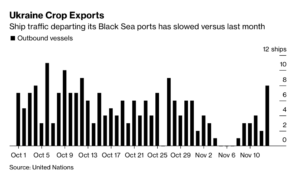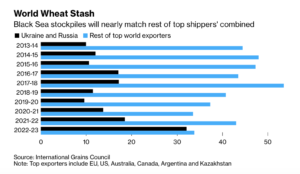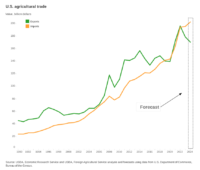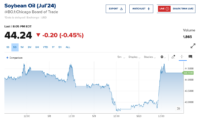Bloomberg's Clarice Couto reported this past Friday that "a surprising tax change in agriculture powerhouse Brazil has the potential to make soy grown in the world’s largest bean exporter less…
Kremlin Expected to Extend Black Sea Export Deal
Bloomberg News reported today that, “Russia is expected to agree to extend a United Nations-brokered deal allowing exports of Ukrainian grain and other farm products from the Black Sea, ensuring a vital flow of foodstuffs to the world market.
Russia is likely to allow the deal to renew after its Nov. 19 expiration, according to four people familiar with the situation, all of whom spoke on condition of anonymity to discuss matters which aren’t yet public. They didn’t specify whether Russia would seek to add new conditions in return for the extension or any other details.
Today’s article added that, “A spokesperson for the joint body administering the deal from Istanbul said there’s nothing to confirm or announce at this stage. Kremlin spokesman Dmitry Peskov said Russia will disclose its decision ‘in due time.'”
“Wheat futures fell as much as 2.1% in Chicago on the news. Paris wheat futures also dropped to the lowest since September.”
“Ukraine has shipped more than 10 million tons of crops through the Black Sea since the deal came into force, led by corn and wheat cargoes. The grain has headed across Asia, Europe and Africa, including some cargoes chartered by the World Food Programme, the UN’s food-aid arm,” the Bloomberg article said.
Today’s article also reminded readers that, “In tandem with the original agreement, the UN pledged to help ensure unimpeded exports of Russian food and fertilizers.”
On that issue, Reuters writer Vladimir Soldatkin reported today that, “Russian Foreign Minister Sergei Lavrov said on Tuesday that the United Nations had told him of written U.S. and EU promises to remove obstacles to the export of Russian grain and fertilisers.
“Lavrov said he had received undertakings on this from U.N. Secretary-General Antonio Guterres at a meeting on the fringes of the G20 summit in Bali, Indonesia.
“Russia has long complained of barriers to its farm exports, even though they are not directly targeted by Western sanctions.”
We are united in our commitment to address food insecurity. Working to meet humanitarian needs, keep food & fertilisers moving, provide emergency funding, improve resilience, accelerate transition to sustainable food systems to withstand future challengeshttps://t.co/6xQV6rS6Pd
— Josep Borrell Fontelles (@JosepBorrellF) November 14, 2022
The article added that, “In spite of the problems, Lavrov said Russia had already exported 10.5 million tonnes of grain, mainly wheat, of which 60% had gone to Asia and 40% to Africa.”

Meanwhile, Bloomberg writers Aine Quinn and Megan Durisin reported yesterday that, “The uptick in Russian shipments puts the country on track to retain its rank as the world’s top wheat exporter. Shippers and insurers had shunned its grain immediately after the war erupted due to concerns about breaking sanctions, and a strong ruble and export tax dampened sales.

“By contrast, the outlook for Ukraine has clouded, following Russia’s temporary stepback from the grain deal in late October. Some inbound vessels are still headed there, keeping grain moving as the deal’s deadline nears. But there is ‘virtually no demand’ by importers for fresh seaborne shipments, analyst UkrAgroConsult said in a recent note.”

Elsewhere, Bloomberg writers Alberto Nardelli, Josh Wingrove, and Daryna Krasnolutska reported yesterday that, “The Ukrainian government is working with supporter nations to fund new shipments of grain around the anniversary of the 1930s Holodomor famine…Officials in Kyiv are seeking funding and support for shipments that would be timed for the late November commemoration of the famine.”
Important initiative #GrainFromUkraine launched by @ZelenskyyUa and coordinated by @AndriyYermak. Ukraine will send additional amounts of grain to the most vulnerable countries through direct purchases by the program’s participants. We call on partners to support this program. https://t.co/n2Bb4wncnm
— Dmytro Kuleba (@DmytroKuleba) November 15, 2022
The Bloomberg article noted that, “Speaking via video link on Tuesday to Group of 20 leaders meeting in Bali, Ukraine’s President Volodymyr Zelenskiy called on all countries – ‘and in particular your countries, dear G-19 leaders – to join our initiative to help the poorest with food,; according to a person familiar with his remarks.
“That was a pointed reference to the group aside from Russia. Foreign Minister Sergei Lavrov, who is representing Russia at the summit, stayed in the room through Zelenskiy’s remarks, officials familiar with the matter said.”
In other news, Reuters writer Pavel Polityuk reported today that, “Ukraine 2022/23 winter grain sowing is 92% complete at 4.4 million hectares so far, the agriculture ministry said on Tuesday.”
Also today, a separate Reuters article by Pavel Polityuk, Maytaal Angel and Nigel Hunt indicated that, “War, rain and economic hardship have depressed Ukraine’s wheat plantings, depriving the nation of vital export earnings in 2023 and heralding another year of tight global supplies and potentially high prices for basic foodstuffs.”
The Reuters article pointed out that, “Ukraine harvested around 19 million tonnes of wheat this year, down more than 40% from the previous season’s record of 33 million tonnes and a further sharp drop in production looks inevitable in 2023, analysts said.
“In a further blow to production prospects, cash-strapped farmers in Ukraine are also reducing use of vital crop inputs such as fertilisers. Less fertiliser means lower yields for the farmers that do plant.”
“The Agricultural Market Information System (AMIS), which was set up by G20 members to strengthen global food security, has warned another poor crop in Ukraine would mean global stocks would not recover for at least another year, ensuring prices remain high and markets volatile.”
Approximately 74% of winter #wheat production is within an area experiencing #drought. pic.twitter.com/rToL40HT1K
— FarmPolicy (@FarmPolicy) November 10, 2022
Meanwhile, Reuters writer Julie Ingwersen reported yesterday that, “The U.S. Department of Agriculture on Monday rated 32% of the U.S. winter wheat crop in good to excellent condition, up 2 percentage points from the previous week and above an average of analyst expectations for a 1-point improvement. Still, the ratings are down significantly from this time a year ago, when 46% of the winter wheat crop was rated good to excellent.
Also yesterday, Dow Jones writer Kirk Maltais reported that, “A meeting between President Biden and Chinese President Xi on the sidelines of the G20 summit Monday didn’t reveal much, but seemed to strike a positive note in the future of diplomacy between the two. During the meeting, the two sides agreed to restore regular lines of communication on a range of topics, including food security. ‘The two leaders discussed the importance of developing principles that would advance these goals and tasked their teams to discuss them further,’ the White House said in a release following the meeting. Grain traders were looking for indications about China’s appetite for U.S. soybeans–no major flash sales of soybeans were announced by the USDA [Monday] morning.”







